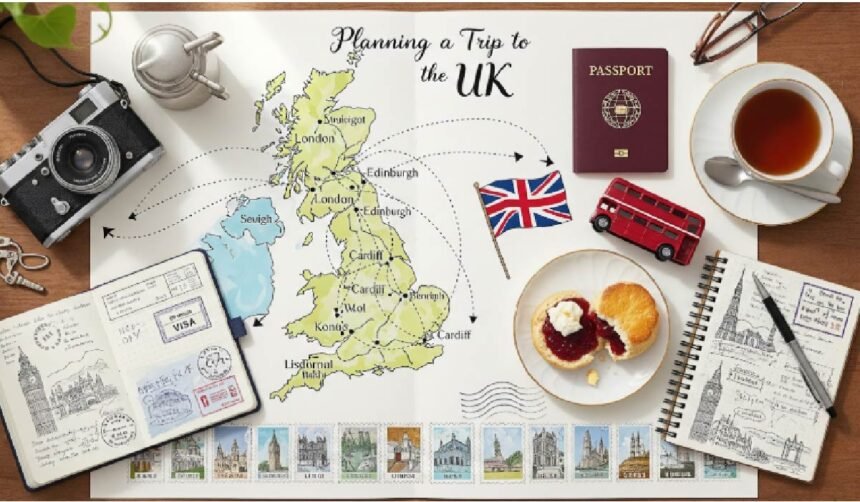Few places can compare to the history, culture, and natural beauty that the United Kingdom offers visitors. Every place, from the busy centre of London to the cobblestone alleyways of Edinburgh, offers something unique. An expedition that goes smoothly or one that is difficult depends on how well you prepare before leaving. A key part of this is your accommodation; choosing one of the UK’s distinctive boutique hotels can deeply immerse you in the local character. Visitors can then concentrate on savouring the experience rather than stressing about practicalities by taking into account travel requirements, seasonal fluctuations, and cultural nuances.
Preparing Travel Documents
Before booking flights, travellers should verify the validity of their passports, as entry often requires a minimum of six months’ validity from the date of arrival. Certain nations require their citizens to apply for a visa or utilise the UK’s gradually implemented Electronic Travel Authorisation (ETA) system. Since processing might take time and unforeseen delays are usual, make sure all paperwork is completed well in advance.
Choosing the Right Season
Your overall experience can be significantly influenced by scheduling, as the weather in Britain varies greatly from season to season. While summer offers long days and exciting festivities, spring delivers blossoming gardens and cooler temperatures. While winter in Scotland offers festive markets and the potential for snow, autumn is appealing due to its spectacular foliage, particularly in rural areas. Take into account regional variations as well; in January, London is still milder than the Highlands.
Navigating Currency and Payments
Although cash is still accepted in the UK, card transactions now account for the majority of everyday transactions. Contactless payments are common in public transport and bars. While most visitors may rely on debit or credit cards without any problems, it is helpful to have a small amount of cash on hand in rural areas or at small markets. To avoid unforeseen card blocks, let your bank know about your trip schedule.
Getting Around the Country
Rail is one of the most efficient modes of transportation since trains can swiftly connect big cities. Especially on intercity routes like London to Edinburgh or Manchester to Glasgow, booking in advance guarantees lower costs. Buses, trams, and subterranean systems are dependable modes of transportation within cities. Renting a car is ideal for people who want to travel to far-flung places like the Scottish Highlands or the Lake District, but be ready for left-hand driving and winding country roads.
Accommodation Choices
The UK has accommodations for every type of traveller, from boutique hotels in ancient villages to low-cost hostels in busy cities. Self-catering cottages are popular among families or parties seeking greater independence, while bed & breakfasts offer a homely touch, particularly in rural England or coastal Wales. Comfort without going over budget is ensured by choosing based on schedule and budget, as major cities offer both luxury properties and reasonably priced chain hotels.
Experiencing Food and Drink
There is much more to British food than meets the eye. While regional districts promote traditional staples like Scottish haggis or Cornish pasties, London’s cosmopolitan influences ensure that global flavours are always accessible. Local pubs sell craft ales and rich meals, and afternoon tea is still a decadent habit. The culinary adventure is enhanced by visiting farmers’ markets, which have fresh produce, baked products, and artisanal cheeses.
Exploring Culture and Attractions
Ancient monuments, such as Stonehenge, and well-known castles, like Edinburgh and Windsor, are heritage sites. Art, history, and innovation are the focus of museums and galleries, and some of them are free to enter. Unlike rural roads, where pedestrians and cyclists have a chance to enjoy the beauty of nature, theatres, especially those found in the West End of London, offer the best performances. Each place is unique, like the beautiful seaside of Cornwall, the moors of Yorkshire, and the Highlands with its spectacular landscape.
Understanding Local Etiquette
British society appreciates politeness and uses such simple phrases as “please” and “thank you” as expected. Never jump queues since people are serious with queuing. In restaurants, tipping is the norm; it is typically about 10 percent, particularly when the service is not included. It is always better to know the etiquette and this way you will find it easier to interact and save yourself some bad situations.
Staying Connected
Although free Wi-Fi is the norm in public libraries, hotels, and cafes, buying a UK SIM card or eSIM is more reliable in terms of texting and mapping. Mobile coverage is good in urban regions and poor in the rural areas. To ensure that you are not lost in the middle of an adventure in the country, save maps offline before heading out to the countryside to ensure that you remain on track even when there is no signal.
Planning for a Seamless Trip
From vibrant metropolises and sleepy villages to natural wonders and cultural treasures, a trip to the UK offers depth and diversity. A pleasant experience is facilitated by preparing paperwork, comprehending practical aspects, and honouring regional traditions. Once the necessities are taken care of, tourists can truly enjoy all that Britain has to offer in terms of charm and diversity.







